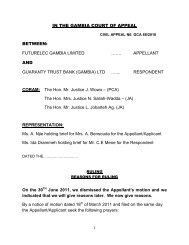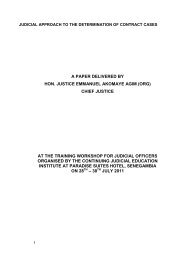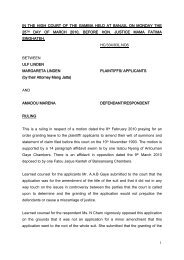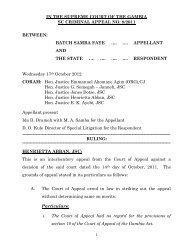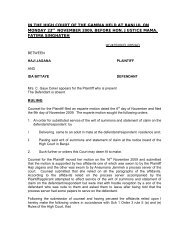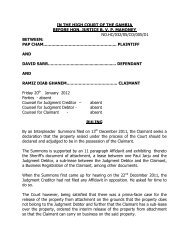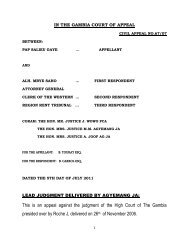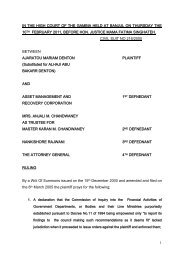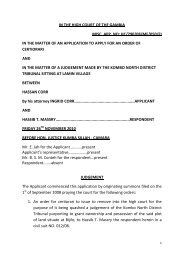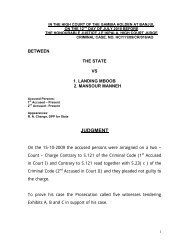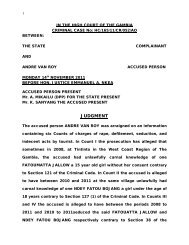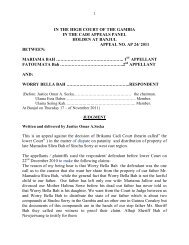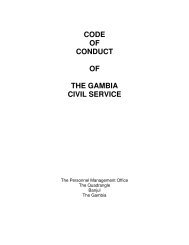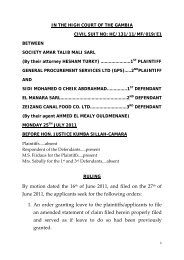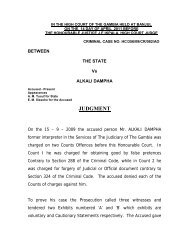IN THE GAMBIA COURT OF APPEAL
IN THE GAMBIA COURT OF APPEAL
IN THE GAMBIA COURT OF APPEAL
Create successful ePaper yourself
Turn your PDF publications into a flip-book with our unique Google optimized e-Paper software.
<strong>IN</strong> <strong>THE</strong> <strong>GAMBIA</strong> <strong>COURT</strong> <strong>OF</strong> <strong>APPEAL</strong><br />
CA No.45/2007<br />
BETWEEN:<br />
ALIEU K. SA<strong>IN</strong>E<br />
…………… Appellant<br />
AND<br />
YAYA MANNEH<br />
………….... Respondent<br />
Appellant<br />
Respondent<br />
…… Present<br />
…… Absent<br />
FRIDAY 5 TH FEBRUARY 2010<br />
O.D. Mbye holds for J.H. Joof for the Appellant<br />
Mr. B. Carrol for the Respondent<br />
CORAM:<br />
Hon. Justice E.A. Ota (PCA)<br />
Hon. Justice J.B. Kalaile (JA)<br />
Hon. Justice J. Wowo (Ag. JA)<br />
J U D G M E N T<br />
LEAD JUDGMENT DELIVERED BY HON. JUSTICE E.A. OTA (PCA)<br />
This is an appeal against the judgment of the High Court of The Gambia per<br />
Anin Yeboah J (as she then was) rendered on the 13 th day of July, 2007, in<br />
Civil Suit No.54/96 commenced by writ of summons dated the 25 th day of<br />
March 1996, wherein the Appellant herein as Plaintiff at the Lower Court
2<br />
claimed the following reliefs against the 1 st<br />
Defendant:<br />
Respondent herein as 1 st<br />
1) A declaration that the Plaintiff is the leasee of a leasehold property held<br />
by him under a lease S.R. No.P.269/1992 and situated at Brufut in the<br />
Western Division of The Gambia;<br />
2) An order confirming the possession of Plaintiff in respect of his leasehold<br />
property situated at Brufut in the Western Division of The Gambia and<br />
held under a lease bearing S.R. No.P.269/1992;<br />
3) Damages in the sum of D500,000 against the 1 st Defendant for<br />
trespassing on the Plaintiffs land;<br />
4) An order declaring as null and void and setting aside the decision of the<br />
Kombo North Authority. Chief Eric Janneh presiding delivered on<br />
10 th March 2006 purporting to set aside, challenge or impeach the<br />
Plaintiff’s lease S.R. No.P.269/1992 in respect of his leasehold property<br />
situated at Brufut in the Western Division of The Gambia;<br />
5) An injunction restraining the 1 st Defendant, his servants, agents and<br />
anyone whomsoever from entering, working on or in anyway interfering<br />
with the Plaintiff’s leasehold property bearing S.R. No.P.269/1992 and<br />
situated at Brufut in the Western Division;<br />
6) Damages;<br />
7) Further or other relief;
3<br />
8) Interest at the rate of 25% per annum on all sums awarded to the<br />
Plaintiff;<br />
9) Costs.<br />
The 1 st<br />
Defendant at the Lower Court denied the Plaintiffs claim and counter<br />
claimed as follows as per his defence and counter claim:-<br />
1) A declaration that he is the rightful owner of the Suitland;<br />
2) Cancellation of Lease Serial Registration No.P.269/1992;<br />
3) Damages for trespass against the Plaintiff;<br />
4) Possession of the Suitland;<br />
5) D25,000.00 being the expenses and cost of materials used by the<br />
Plaintiff on the Suitland;<br />
6) Interest on any award granted by this court at the rate of 25% per<br />
annum from 1 st April 1990 to date of Judgment, costs and any other<br />
relief.<br />
The 2 nd<br />
Defendant also denied the Plaintiff’s claim though they filed a<br />
statement of defence, they did not however participate in the proceedings.<br />
After a consideration of the evidence adduced before her the Learned Trial Judge<br />
in her judgment delivered on the 13 th day of July, 2007, dismissed the 1 st<br />
Defendant’s counter claim and held that the Plaintiff established his title to the<br />
Suitland. The court in conclusion however held that inspite of its earlier finding
4<br />
that the Plaintiff established his title to the Suitland, that the valid and subsisting<br />
judgment of the Kombo North District Tribunal between the same parties, on<br />
the same question, in relation to the same subject matter, rendered the Suit at<br />
the Lower Court res judicata.<br />
It is against the backdrop of the foregoing facts and in dissatisfaction thereof,<br />
that the Plaintiffs as Appellants herein, commenced this appeal via Notice of<br />
Appeal filed on the 18 th of August 2007, upon the following grounds:-<br />
1) The Learned Trial Judge erred in law and in fact in holding contrary to the<br />
binding judgment of The Gambia Court of Appeal in Belgolaise V Fawaz<br />
GR (1997-2001) P.563 that it was mandatory necessary or essential for<br />
the Appellant to appeal against the decision of the kombo North<br />
District Tribunal which was stated and pleaded to be without<br />
jurisdiction and null and void.<br />
PARTICULARS <strong>OF</strong> ERROR<br />
a. The Learned Trial Judge fell into error in her interpretation of the<br />
decision of Belgolaise V Fawaz contained in Gambia Law Reports<br />
1997-2001 page 559-564 in particular the citation of Macfoy V<br />
UAC and her reliance on a decision which was obiter dicta in that<br />
she misinterpreted the binding judgment of the Gambia Court of<br />
Appeal to mean that it was necessary and mandatory to appeal<br />
against the judgment made without jurisdiction or void when it<br />
stated that it was desirable to have it set aside and not that it<br />
should be appealed against especially in the light of Evidence Act<br />
1994 S.53<br />
2) The Learned Trial Judge erred in law and in fact in holding that it was<br />
unnecessary to determine whether the judgment memorial tendered in
5<br />
the Suit complied with S.12 and S.14 of the land (Registration of<br />
Deeds) Act Cap 57.01.<br />
PARTICULARS <strong>OF</strong> ERROR<br />
a. The Learned Trial Judge having fallen into error to wit that it was<br />
necessary to appeal against the judgment of the Kombo North<br />
District Tribunal failed to rely on the binding judgment of the<br />
Gambia Court of Appeal in Belgolaise V Fawaz and failed to<br />
determine whether she could set aside the judgment of the<br />
Kombo North District Tribunal as the Gambia Court of Appeal<br />
did in Belgolaise V Fawaz or whether the judgment of the<br />
Kombo North District Tribunal was validly or properly<br />
registered pursuant to S.12 and S.14 of the Land (Registration<br />
of Deeds) Act Cap 57.01.<br />
3) The Learned Trial Judge erred in law and in fact in failing to determine<br />
whether the Kombo North District Tribunal had jurisdiction to<br />
determine the Suit which dealt with land covered by a Lease SR<br />
No.P.269/1992 or whether it was only determinable by the High Court<br />
being land under the State Lands Act 1991;<br />
4) The Learned Trial Judge erred in law and in fact in effectively giving<br />
judgment in favour of the Respondent in respect of the Suitland when she<br />
previously held in her judgment that his counter claim fell flat and had<br />
failed and that the Plaintiff had proved his title to the satisfaction of the<br />
court citing inter alia the evidence of their common grantor, receipts, and<br />
the developments made by Appellants on the Suitland;
6<br />
5) Without conceding that the Kombo North District Tribunal had<br />
jurisdiction over the Suitland, the Learned Trial Judge erred in law and in<br />
fact in failing to hold that the dismissal of the Respondent’s case against<br />
the Appellant’s privy and grantor Alh. Kalifa Sanno by the same tribunal<br />
headed by Chief Dodou Touray was binding on the Kombo North<br />
District Tribunal and Respondents could not sue the Appellant on the<br />
same issue before the said Tribunal.<br />
6) The judgment is against the weight of the evidence.<br />
Relief sought from this court are as follows:<br />
1. An order that the Kombo North District Tribunal had no jurisdiction to<br />
determine the ownerships of the Suitland being land under the State<br />
Lands Act 1991;<br />
2. An order setting aside the judgment of the High Court delivered on 13 th<br />
July, 2009, and entering judgment for the Appellants;<br />
3 Further or other relief;<br />
4. Costs.<br />
It is apposite for me from this juncture to refer to the Plaintiff as Appellant and<br />
the 1 st Defendant as 1 st Respondent. Briefs were ordered, filed and<br />
exchanged. The Appellant’s brief was filed on the 28 th of October, 2009. I<br />
notice a fundamental defect in the Appellants brief. This defect is based on the<br />
fact that Learned Counsel for the Appellant, Mr. J.H. Joof, failed to formulate<br />
issues for argument in the brief, rather basing his argument on the grounds of<br />
appeal themselves. Whilst conceeding that our rules are silent on the question
7<br />
of issues in brief writing, I however find that it is a well settled practice in this<br />
jurisdiction based on the preponderance of case law on the subject matter that<br />
issues are formulate in briefs. A restatement of this fact in a myriad of cases has<br />
rendered this practice sacrosanct.<br />
I find the question of issues in brief writing a practice founded on good<br />
reasoning. This is because issues serve as a guide to the court in determining<br />
cases. Its purpose is to enable the parties narrow down the questions in<br />
controversy in the interest of accuracy, clarity and brevity. Thereby deterring<br />
the court, as well as litigants, from falling into the danger of going on a fishing<br />
expedition, ultimately resulting in an unnecessary waste of time, and money, and<br />
more often than not in a miscarriage of justice.<br />
The above importance of issues not withstanding, the absence of issues in a brief<br />
has been held not to be enough reason for the court to throw the brief in the<br />
waste bin like an unwanted meal, provided the brief addresses the questions<br />
arising from the grounds of Appeal. See Jurgen Despiegelare (as<br />
Administrator of the Estate of Petra Despiegelare (Deceased) and anor<br />
V Ebrima Sanneh CA No.19/07 (unreported decision of the Court of Appeal<br />
delivered on the 18 th of December 2009). See also the Supreme Court of<br />
Nigeria decisions in Weide and Co (Nigeria) Ltd V Weide and Co<br />
Hamburg (1992) 6 NWLR P6 249 627 and Echo Enterprises Ltd V<br />
Standard Bank of Nigeria Ltd and anor (1989) 4 NWLR (Pt. 116) 509.<br />
Having fulfilled my judicial responsibility in commenting on the issueless brief, I<br />
will in the light of the totality of the foregoing not discard the said brief but use it<br />
in the interest of substantial justice.
8<br />
The 1 st Respondent for his part filed the 1 st Respondent’s brief filed on the<br />
23 rd of November 2009, wherein 1 st Respondent’s Counsel Mr. B. Carrol,<br />
distilled five issues from the grounds of appeal and argued along same to wit.<br />
1) Was the judgment of the District Tribunal void?<br />
2) Even if the judgment of the District Tribunal was void should it be ignored<br />
and the same issues relitigated in the face of the fact that there is a valid<br />
subsisting judgment in favour of 1 st Respondent declaring inter alia that<br />
the Suitland belonged to the 1 st Respondent, after hearing the parties?<br />
3) Does the District Tribunal have the jurisdiction to deal with leasehold<br />
properties?<br />
4) Did the trial judge have jurisdiction to evaluate the evidence in the Suit<br />
below and make a pronouncement as regards the counterclaim?<br />
5) Was there any evidence before the High Court to the effect that 1 st<br />
Respondent instituted an action against the Appellant’s grantor, and<br />
lost, and could the learned judge have considered such evidence, if it<br />
existed, in the face of the fact that the Suit was res judicata?<br />
I have carefully considered the foregoing issues and I find they are somewhat<br />
repetitive which fact is borne out of the convoluted nature of the grounds of<br />
appeal. In as much as I find that these issues address the grounds of appeal, I<br />
however prefer to determine this appeal based on the following issues namely:<br />
1) Did the trial court have the jurisdiction to determine the question of the<br />
validity of the decision of the Kombo North District Tribunal?
9<br />
2) Is the decision of the Kombo North District Tribunal null and void for<br />
lack of jurisdiction?<br />
3) Is the decision of the Kombo North District Tribunal void for non<br />
compliance with the provisions of S.12 and S.14 of Land (Registration<br />
of Deeds) Act Cap 57.04 Laws of The Gambia 1990?<br />
4) Was the Suit at the High Court res judicata as held by the trial judge?<br />
5) If the Suit was res judicata, did the trial judge have the jurisdiction to<br />
determine the Suit on the merits, find for the Appellant and dismiss the<br />
Respondent’s counter claim?<br />
ISSUE ONE<br />
Did the Trial Court have the jurisdiction to determine the question of the validity<br />
of the decision of the Kombo North District Tribunal?<br />
This is a vexed question in this appeal. In arguing this question the parties<br />
relentlessly urged the decision of this court in Belgolaise V Fawaz (supra), as<br />
well as the celebrated dictum of Lord Denning MR in Macfoy V UAC (1961)<br />
3 ALL ER 1169, PC.<br />
The funor generated by these authorities is predicated on the interpretation<br />
given to them by the Learned Trial Judge, which led her to decline jurisdiction<br />
over the question of whether the decision of the Kombo North District<br />
Tribunal upon which the Respondents founded their defence of estoppel at the<br />
trial nisi prius, was null and void. The Learned Trial Judge held that the only<br />
medium, via which the courts competence could be invoked over the said<br />
decision, was if same was conveyed to it by way of an appeal. She based her<br />
views on her interpretation of this courts decision in Begolaise V Fawaz
10<br />
(supra). The 1 st Respondent accedes to the views of the Learned Trial Judge;<br />
whilst the Appellant is vehemently opposed to same. His stance is that once the<br />
decision of the Kombo North District Tribunal was relevant to the<br />
determination of the Suit at the trial court and its validity is questioned, the trial<br />
court was obliged pursuant to the decision in Belgolaise V Fawaz and S.53 of<br />
the evidence Act 1994, to determine it, before taking any further steps in the<br />
matter. This is irrespective of the fact that the said decision was not challenged<br />
before the court by way of an appeal.<br />
What then is the purport of this courts decision in Belgolaise V Fawaz. A<br />
statement of the facts of that case would enhance an understanding of same. In<br />
that case the Appellants case was dismissed at the Lower Court. The Appellants<br />
i.e. Plaintiffs at the Lower Court sought the leave of the High Court to appeal<br />
against same in contravention of the provisions of S.130 (3) of the Constitution<br />
of The Republic 1997, which states in clear and unambiguous words that such<br />
appeals lie as of right. The High court fell into the error of granting the leave<br />
sought. The High Court committed the further predicating error of the said leave<br />
on payment of some costs within 7 days.<br />
On appeal to this court against the dismissal of the Suit at the Lower Court, the<br />
Appellants who themselves as Plaintiffs at the Lower Court had erroneously<br />
applied for the said leave to appeal, boldly condemned both their actions<br />
applying for said leave and the orders of the High Court granting same on<br />
condition, as incompetent and thus a nullity. The Respondents for their part<br />
argued that an order emanating from a court of competent jurisdiction had to be<br />
obeyed and it did not lie with the Appellants to ignore it. They further contended<br />
that as long as the Appellants failed to comply with the order granting leave<br />
upon costs, the appeal purportedly filed without said compliance, was<br />
incompetent and remained incompetent.
11<br />
In its decision, this court held thus “when a judge has decided the issue of<br />
jurisdiction wrongly, his decision would not give him jurisdiction which he did not<br />
have, but that decision must be first set aside. Even though neither counsel<br />
adverted to Section 53 of the Evidence Act, 1994 (No.14 of 1994) (as<br />
stated above), it is noteworthy to observe that it provides for a situation such as<br />
is before the court. In the instant case, the order made by the High Court Judge<br />
granting leave on terms was made without jurisdiction as the court had no power<br />
to make it. Consequently, on the authority of Timitimi V Amabebe (1953) 14<br />
WACA 374 and by virtue of Section 53 of the Evidence Act, 1994, the said<br />
order was void and a nullity and the same would be set aside. Having set aside<br />
the order as being void and a nullity for want of jurisdiction, it is from this point<br />
that the effects of Lord Denning’s Distinctions in Macfoy V UAC Ltd<br />
although obiter, come into play. Applying to the instant case, the principles in<br />
Macfoy case “You cannot put something on nothing and expect it to stay there.<br />
It will collapse,” the objections of counsel for the Respondent founded on the<br />
order set aside would equally collapse and are thus overruled.”<br />
It is obvious that this court relied on the decision of Timitimi V Amabebe<br />
(supra) and S.53 of the Evidence Act 1994, to set aside the orders of the<br />
Lower Court even though there was no formal appeal against same. As stated<br />
by the court on Page 563 of that report “The case of Timitimi (supra) is an<br />
authority of the proposition that a party such as the applicants is, could plead in<br />
this court that the order relied upon by the Respondent was made without<br />
jurisdiction, not withstanding the fact that no proceedings had been taken to set<br />
that order aside”.<br />
Furthermore S.53 of the Evidence Act 1994 also relied upon States: “Any<br />
party to a Suit or other proceedings may show that any judgment, order, decree<br />
which is relevant under Section 49, 50 or 51 and which has been proved by
12<br />
the adverse party, was delivered by a court without jurisdiction or was obtained<br />
by fraud or collusion.”<br />
I see five clear features that emanate from the foregoing decision in Belgolaise<br />
V Fawaz which to my mind constitute the purport of that decision. These<br />
features are as follows:-<br />
1) A judgment entered without jurisdiction is a nullity and is liable to be set<br />
aside;<br />
2) The judgment of a court of competent jurisdiction cannot just be ignored,<br />
if it is found to be void, it must first be set aside See Aladegbemi V<br />
Fasanunade (1988) <strong>IN</strong>SCC 1087 SC;<br />
3) A party could plead in court that an order relied upon by the opponent<br />
was made without jurisdiction, not withstanding the fact that no<br />
proceedings e.g. by way of an appeal, had been taken to set that order<br />
aside;<br />
4) Once the question of the nullity of an order relied upon or relevant to the<br />
determination of a case is raised, it behoves the court to determine that<br />
question, and if the order is found to be void for lack of jurisdiction, to set<br />
same aside even though no formal proceedings e.g. by way of appeal, is<br />
taken to set same aside;<br />
5) After setting the void order aside, the court is then obliged to set aside<br />
any other actions, orders, proceedings etc founded on the void order, in<br />
line with the dictum of Lord Denning in Macfoy (supra) “if an act is<br />
void, then it is in law a nullity. It is not only bad, but incurably bad.<br />
There is no need for an order of the court to set it aside. It is
13<br />
automatically null and void without more ado though it is sometimes<br />
convenient to have the court declare it to be so. And any proceeding<br />
founded on it is also bad and incurably bad. You cannot put something<br />
on nothing and expect to stay there. It will collapse”(underline mine).<br />
It is clear therefore that in Macfoy (supra) Lord Denning did not propound<br />
the theory that a judgment of a court of competent jurisdiction can just be<br />
ignored because it is perceived by a party to be a nullity. Such a position as<br />
rightly held by the Supreme Court of Nigeria in Aladegbemi V Fasanunade<br />
(supra) would enthrone anarchy and lawlessness in the society, giving parties<br />
aggrieved the mandate to act in flagrant disregard of same and in contempt of<br />
court.<br />
I am in complete agreement that once a judgment that is a nullity is pleaded in a<br />
case, the court needs no formal proceedings, that is by way of appeal, etc., to<br />
set it aside. Therefore, where a court is faced with the question of the<br />
competence of an order relevant to the matter before it, it behoves the court to<br />
determine the competence of the order before it takes any further steps. Once<br />
the court determines that the order, decree, judgment, is null and void for want<br />
of jurisdiction, it is the duty of the court to set same aside, whether the question<br />
of its competence was raised by way of appeal or not. It is my firm believe that<br />
such a matter can be raised at anytime, in any manner and at any stage of the<br />
proceedings, even for the first time on appeal. This power of the court to set<br />
aside a null and void order or judgment being inherent is neither original nor<br />
appellate, so that where there is no competent appeal before an appellate court<br />
because the judgment appealed against is a nullity, the appellate court, in the<br />
exercise of that inherent power can declare the judgment a nullity even though it<br />
cannot exercise its appellate jurisdiction.
14<br />
This is premised on the fact that a null act is void abinitio. It amounts to<br />
nothing, it amounts to no proceedings. It is an act which may be treated as<br />
though it had not taken place, or which has absolutely no legal force or effect.<br />
It is for the totality of the reasons ante, that I agree with the Appellant that the<br />
Learned Trial Judge misinterpreted the decision of this court in Belgolaise V<br />
Fawaz, when she held that the validity of the decision of the Kombo North<br />
District Tribunal which was pleaded by the Appellant and upon which the 1 st<br />
Respondent had founded his defence of estoppel at the Lower Court, was<br />
required to be raised before it by way of appeal, before it could be<br />
countenanced. I say this because the defence of estoppel can only be grounded<br />
on a valid and subsisting judgment of a court of competent jurisdiction. The<br />
Learned Trial Judge was thus required to determine the validity of that decision,<br />
but failed to do so.<br />
Inspite of failing to determine the competence of the said decision of the<br />
Kombo North District Tribunal, the trial court went ahead and relied on it in<br />
declaring the Suit at the Lower Court Res judicata. There is a need therefore for<br />
us to find out if the trial judge was correct on this question. In doing this, we<br />
must first find out if the said decision was null and void as alleged. This is<br />
because as I said before in this judgment, the defence of estoppel can only be<br />
founded on the decision of a court of competent jurisdiction. This leads us to<br />
issue two.<br />
ISSUE TWO<br />
Is the decision of the Kombo North District Tribunal null and void for lack of<br />
jurisdiction?<br />
It was contended for the Appellant in Appellant’s brief, that the Kombo North<br />
District Tribunal could only deal on the customary law of the indigenes and
15<br />
thus lacked the jurisdiction to make the decision of 13 th May 2006, which<br />
decision was in respect of a leasehold property held under S.R No.P.269/1992<br />
and issued by the state under the State Lands Act 1990. That any Suit in<br />
respect of leasehold properties is the exclusive province of the superior courts,<br />
especially the High Court, pursuant to the State Lands Act 1990 as amended,<br />
S.55 of the Courts Act, as well as the Constitution of the Republic 1997.<br />
On the other hand, it was argued Replicando for the 1 st Respondent in 1 st<br />
Respondent’s brief, that apart from applying customary law, the District<br />
Tribunal has the jurisdiction to deal with Suits in relations to all lands within its<br />
area of operation. That S.7 and S.10 of the District Tribunal Act did not<br />
draw any distinction between leasehold land or customary land. That as long as<br />
both the parties and the property lie within the jurisdiction of the District<br />
Tribunal, that the District Tribunal has the jurisdiction pursuant to S.7 of the<br />
District Tribunal Act to deal with it. It was further contended that pursuant to<br />
S.7 of the State Lands Act of 1990, that all lands previously held under<br />
customary tenure were converted to deemed leases. Therefore, so goes the<br />
arguments, the Suitland had ceased to be held under customary tenure since<br />
1991. That in this event the only type of property that the District Tribunals<br />
had jurisdiction over after the coming into effect of the State Lands Act 1990,<br />
were leasehold properties, be it “deemed leasehold property” or actual leasehold<br />
property”.<br />
1 st Respondent’s Counsel also advanced the view that the fact that the<br />
decision of the Kombo North District Tribunal was entered on a Sunday,<br />
cannot operate to void the decision pursuant to S.6 of the District Tribunal<br />
Act, which empowers the Tribunal and the Commissioner to direct that sessions<br />
are held at such times and places as they shall deem fit. Counsel made<br />
references to S.5 (1) and (2) of the Public Holiday Act, contending that
16<br />
nothing in this statute prohibits the District Tribunal or any other body or<br />
institution, from working on a Sunday.<br />
I have carefully considered the different posture of the two sides to this contest,<br />
and let me say straightaway that the District Tribunals, are creations of<br />
statute. Their jurisdiction is therefore derived from the enabling statute which is<br />
the District Tribunal Act Cap 6.01 Law of the Gambia 1990. It is to this<br />
statute that recourse must of necessity be had in a bid to ascertaining the limits<br />
of the jurisdiction of the District Tribunal over customary land, or leasehold<br />
land or both. It is also this statute that must enlighten us as to the days<br />
prescribed for the sessions of the District Tribunals.<br />
For the purposes of ascertaining the jurisdiction of the District Tribunal, we<br />
must examine the provisions of Section 7 and S.10 of the District Tribunal<br />
Act, urged by the 1 st Respondent. They provide thus.<br />
“7. Every District Tribunal shall have full jurisdiction, to the extent set forth<br />
in the order establishing it and, subject to the provisions of this Act over<br />
cases and matters in which all the parties are resident or being within the<br />
area of the jurisdiction of the Tribunal.<br />
10. The civil jurisdiction of a District Tribunal shall extend, subject to the<br />
provisions of this Act to the hearing, trial and determination of all civil<br />
suits and matters in which the Defendant is ordinarily resident within the<br />
area of the jurisdiction of the Tribunal or in which the cause of action shall<br />
have arisen within the said area.<br />
Provided that civil proceedings relating to immovable property shall be taken in<br />
the District Tribunal within the area of whose jurisdiction the property is<br />
situated”.
17<br />
It would appear to me that the foregoing provisions drew no distinction between<br />
leasehold property and customary property in conferring jurisdiction on the<br />
District Tribunals. These provisions clearly confer jurisdiction on the District<br />
Tribunals to determine all Civil Suits and matters in which the defendant is<br />
ordinarily resident within the jurisdiction of the tribunal or in which the cause of<br />
action arose. Implicit from the proviso to S.10 is that the District Tribunal has<br />
the jurisdiction to hear and determine all Civil Suits and matters relating to<br />
immovable property, which are located within the area of jurisdiction of the<br />
District Tribunal. Again, the Act in referring to immovable property drew no<br />
distinction between leasehold property and customary property. Therefore, this<br />
provision by its wording appears to encompass both leasehold property and<br />
customary property. Furthermore, S.6 (1) (b) of the District Tribunal Rules<br />
Cap 6.03 Laws of The Gambia provides thus<br />
“6 (1) There shall be two grades of District Tribunals and each grade<br />
shall, subject to any extension or limitation which may appear in<br />
the order establishing the Tribunal, exercise respectively the<br />
jurisdiction set out hereunder:-<br />
(b)<br />
Group Tribunals –<br />
Full jurisdiction in cases concerning land, or in or in which the title<br />
to land or any interest therein comes in question”.<br />
It is worthy of note that S.6 (1) (J) confers the same jurisdiction on Single<br />
District Tribunals. Here again, statute has not drawn any distinction between<br />
the types of land over which the District Tribunals have jurisdiction. The<br />
implication therefore is that District Tribunals have full jurisdiction in causes<br />
concerning land located in their area of jurisdiction irrespective of whether the<br />
land in question is a leasehold property or one held under customary tenure.
18<br />
Now, Mr. J H Joof has urged the provisions of the State Lands Act 1990, in a<br />
bid to establish that leasehold properties be it situate in the provinces, or not,<br />
are State Lands, and are therefore outside the jurisdiction of District Tribunals.<br />
A look at that statute will help to confirm or dispel this notion, as well as the<br />
notion created by the submission of Mr. B. Carrol for the 1 st Respondent,<br />
citing S.7 (1) and (2) of the State Lands Act 1990, that with the coming into<br />
effect of the State Lands Act, that all lands held under customary tenure were<br />
converted into leasehold properties called “deemed leases” including the<br />
Suitland. What then does the State Land Act 1990, say concerning these<br />
subject matters? I find a need in this exercise to reproduce verbatim certain<br />
portions of that statute for a better understanding of the conclusions reached.<br />
State land is defined as follows in the State Land Act, “State Land” means all<br />
land referred to under Section 4 and all lands which have been or may<br />
hereafter be acquired by or on behalf of the state for any public purpose or<br />
otherwise however and all such land so designated by the minister under the<br />
Act.<br />
Section 4 of the Act provides thus<br />
“4. All land in Banjul and Kombo Saint Mary, excluding such land as is<br />
held in fee simple and subject to any grant which has been or may<br />
hereinafter be made, shall rest in the state absolutely”.<br />
Section 3 of the Act defines the area of the application of the Act in the<br />
following words:
19<br />
“3. This Act shall apply to all land in Banjul and Kombo Saint Mary and to<br />
such other areas as the Minister may by order published in the Gazette,<br />
designate”.<br />
Section 5 of the Act provides for designation of any area as state land by the<br />
Minister as follows:<br />
“5 (1) The Minister may, by order published in the Gazette, designate<br />
any provinces land for the purpose of this Act<br />
(2) Where any area is designated under Sub-section (1) of this section.<br />
(a)<br />
All land in such area shall, excluding such land as is held in fee<br />
simple, vest in and be administered by the state for the use and<br />
common benefit direct or indirect of the community in which such<br />
land is situated and<br />
(b)<br />
The Lands (Provinces) Act shall not apply to such areas”.<br />
It is clear from the foregoing Provisions of Sections 3, 4 and 5 of the State<br />
Lands Act, that State Land are all land in Banjul and the Kombo Saint Mary,<br />
excluding those held in fee simple, and subject to any grant, as well as any<br />
provinces land, which are designated to be State Land by the Minister by order<br />
published in the Gazette (excluding those held in fee simple). Therefore, I find<br />
Mr. Carrols submission that all customary land became deemed leases with the<br />
coming into effect of the State Lands Act 1990, erroneous. This is because as<br />
I have already demonstrated in this judgment, the litera legis of the said<br />
statutes is to the effect that it is only customary land in designated areas that<br />
became deemed leasees pursuant to the said statute, infact that is the purport of<br />
S.7 (1) of the State Lands Act. Implicit from this is that all land held under
20<br />
customary tenure which are not situated in designated area, still remained<br />
customary land. I must also say that the State Lands Act 1990, did not oust<br />
the jurisdiction of the District Tribunals over leasehold properties located in<br />
the provinces and confer same on the High Court of The Gambia, as is<br />
propounded by Mr. J H Joof. I have frantically searched that legislation and I<br />
see no provision to that effect and none is urged on us. It is rather my views,<br />
that S.7 (7) of the State Lands Act, confirmed the jurisdiction of the District<br />
Tribunals over all causes and matters within their areas of operation in the<br />
following parlance “if there be any dispute as to whether a person holds any land<br />
under customary law or any other matter relevant thereto, such dispute shall be<br />
heard and determined by the Board who may refer the matter to and seek the<br />
views of the relevant District Tribunal”.<br />
The foregoing provision must be read inconsonance with S.7 (1) which provides<br />
thus “any person who holds any land in a designated area under customary<br />
tenure or year to year tenancy shall at the date on which such area is designated<br />
and subject to the provisions of this Act, be deemed to be a leasee of such land”.<br />
It is therefore clear that S.7 (7) is meant to take care of a scenario where a<br />
dispute arises as to whether land in the provinces is customary land or deemed<br />
lease, and confered jurisdiction on both the Board and the District Tribunals to<br />
determine that question. With the abolision of the Board pursuant to the State<br />
Land Amendment Act, the resolution of such dispute rest solely on the District<br />
Tribunals. It is only after the question has been determined by the District<br />
Tribunal, that an aggrieved party has a right to proceed to the High Court by<br />
way of appeal pursuant to S.7 (8) of the Act which provides “A deemed leasee<br />
who is adversely affected or dissatisfied with any decision made under Subsection<br />
(6) or Sub-section (7) of this Section, may appeal to the Supreme<br />
Court” i.e the High Court. It is worthy of note that Appeals lie from any<br />
judgment, order, decision of a District Tribunal in any case, or of a
21<br />
Commissioner in exercise of his reversionary power under Section 23 (1) (a) of<br />
the District Tribunals Act to the High Court, in the same manner as if such<br />
appeal were from a subordinate court to the High Court. See the text The<br />
Gambia Legal System by Emmanuel Akomaye Agim Page 132-137, on the<br />
jurisdiction of the District Tribunal.<br />
There is therefore no controverting the fact that District Tribunals, inclusive of<br />
the Kombo North District Tribunal, have jurisdiction over all causes and<br />
matters with respect to land, interest or title in land, be it leasehold property or<br />
customary property, within their areas of jurisdiction. I am of the firm conviction<br />
that if it was the intention of legislature to oust the jurisdiction of the District<br />
Tribunals over deemed leases or leasehold property within their areas of<br />
jurisdiction, that the makers of our laws would have said so in clear and<br />
unambiguous words.<br />
It is in the light of the reasons ante, that I find that the Kombo North District<br />
Tribunal had the jurisdiction to determine the question of the title to the<br />
leasehold property held under lease Serial Registration No.P.269/1992,<br />
which property is located within its area of jurisdiction. The judgment of that<br />
Tribunal rendered on the 10 th day of March 1995, is therefore final, valid and<br />
subsisting, until it is set aside by a higher court of competent jurisdiction. I must<br />
say that I agree with Mr. Bola Carrol, that the day that the said judgment was<br />
rendered being a Sunday cannot also operate to invalidate the said decision, as<br />
canvassed by the Appellant. In coming to this conclusion, I am mindful of the<br />
fact that Sunday not being a working day is ordinarily not a day that a court<br />
would hold its sessions. However, the scenario is different in this case, in that<br />
Section 6 of the District Tribunal Act and the proviso thereto, mandates the<br />
District Tribunals and Commissioner respectively, to decide on the times and<br />
places where the Tribunal shall sit. Section 6 provides thus
22<br />
“A District Tribunal shall hold sessions at such times and places as may be<br />
necessary for the convenient and speedy dispatch of the business of the<br />
Tribunal.<br />
Provided that the Commissioner may direct sessions to be held at such times<br />
and places as he shall think fit.”<br />
I find it therefore incontrovertible that the question of the day, the hour and<br />
location that the District Tribunal’s sessions are held, are at the discretion of<br />
both the District Tribunals and the Commissioner. I apprehend that the<br />
spirit behind this provision or the intent of legislature, is to enhance the work of<br />
the District Tribunals, by making their sessions flexible in other to<br />
accommodate its members who are usually drawn from all works of life, and<br />
therefore, as rightly submitted by Mr. Carrol, in paragraph 27 of the 1 st<br />
Respondent’s brief, “are usually busy during the week days doing their normal<br />
work.” I take judicial notice of this fact.<br />
It is for the above reasons that I am firmly resolved, that the fact that the<br />
decision of the Kombo North District Tribunal was given on a Sunday cannot<br />
operate to void the judgment. More so in the face of the fact, that there is no<br />
evidence to show that that day was not elected by either the District Tribunal<br />
or the Commissioner for the session of the Tribunal. The Appellants<br />
contention in this regard therefore fails. We come to the next issue also<br />
propounded by the Appellant to void the said judgment as coached in Issue<br />
Three.<br />
ISSUE THREE<br />
Is the decision of the Kombo North District Tribunal void for non compliance<br />
with the Provisions of S.12 and S.14 of the lands (Registration of Deeds)<br />
Act Cap 57.04 Laws of The Gambia 1990.
23<br />
The Appellant contends that the said decision is void for non compliance with the<br />
Land (Registration of Deeds) Act. His contest in this regards, is premised<br />
on the supposition that the alteration of the date on the judgment memorial and<br />
the fact that no plan was annexed thereto, violated Sections 12 and 14 of the<br />
Land (Registration of Deeds) Act. That this fact rendered the said judgment<br />
not registered as required by the Act, which non registration must operate to<br />
void the said judgment. I find that the Appellant’s argument in this respect is<br />
based on the language of S.12 (1) of the Land (Registration of Deeds) Act,<br />
which rendered judgments affecting land void for non registration after 16 days<br />
from the date thereof. That provision states thus “Every judgment shall be void,<br />
so far as regards any land to be affected thereby, unless registered by memorial<br />
within sixteen days from the day thereof”.<br />
Let me straightaway state here that I have no wish to belabour this issue. This<br />
is because as rightly pointed out by Mr. Carrol in Paragraph 39 of the 1 st<br />
Respondent’s brief, the question of the applicability of S.12 (1) of the Land<br />
(Registration of Deeds) Act, to void a judgment of a court of competent<br />
jurisdiction, sixteen days after same was rendered, has been settled by case<br />
law in this jurisdiction. A case in point is the celebrated decision of this court in<br />
Edward Graham V Lucy Mensah reported in (2002-2008) GR 22, where<br />
the court held that non registration of a judgment cannot nullify a valid judicial<br />
decision and declared S.12 (1) of the Land (Registration of Deeds) Act<br />
unconstitutional to this extent. It is worthy of note that the Supreme Court of<br />
The Gambia affirmed this decision in its recent decision in the case of Edward<br />
Graham V Ruth Rowe (Legal Representative of the Late Lucy Mensah)<br />
(unreported decision of The Supreme Court of The Gambia in SC Civil Appeal<br />
No.4/2006, delivered on Friday the 20 th of November, 2009.) The very<br />
instructive words of Jones Dotse JSC, to be found on Page 19 of that decision<br />
is worthy of restatement. He declared thus
24<br />
“The intention of courts in these modern times is to strive to do substantial<br />
justice. In our quest to do substantial justice to the parties in this case, it is<br />
important to adopt the purposive approach to the interpretation of the<br />
Constitution and the Act. When that approach is applied, the only rationale,<br />
logical and reasonable interpretation, will be to declare Section 12 (1) of the<br />
Land (Registration of Deeds) Act, as being inconsistent with the provisions<br />
of the Constitution especially, Sections 4,7,100 (2) (c) and 120 (2) to the<br />
extent that it purports to make judgments of courts of competent jurisdiction<br />
void. Thus, it is the void effect which Section 12 (1) of the Act renders<br />
judgment that has been declared unconstitutional, whilst the administrative<br />
obligations to file judgments under the Act generally is preserved.<br />
With this constitutional interpretation, it does not even matter whether the<br />
registration regime is not pursued or complied with after the delivery of a final<br />
non-appealable judgment”.<br />
I find therefore that, the complaints of the Appellant that the decision of the<br />
Kombo North District Tribunal is rendered void for non compliance with the<br />
registration requirements, is completely extinguished, in the face of the<br />
foregoing pronouncement of the apex court in the land. This issue is resolved in<br />
favour of the 1 st Respondent.<br />
ISSUE FOUR<br />
Was the suit at the High Court res judicata as held by the Learned Trial Judge?<br />
The principle of estoppel per rem judicata is that a party is estopped from<br />
relitigating the same issue between the same parties and on the same subject<br />
matter on which a decision of a court of competent jurisdiction had been made.<br />
The rules of res judicata apply in the Gambia as part of common law by virtue of
25<br />
S.7 (d) of the 1997 Constitution, as statutory law by virtue of S.54 of the<br />
Evidence Act and S.64 CPC and as a Constitutional and fundamental law by<br />
virtue of S.24 (6) of the Constitution of the Republic, 1997. The policy<br />
that underpines the principle is not only the avoidance of double jeopardy, but<br />
that it is in public interest that there be an end to litigation. The maxin “interest<br />
reapublice ut sit finis litum” applies.<br />
The rules of res judicata were concisely stated by Brett MR in Re May (1885)<br />
28 Ch.D 516 as follows:- “It is a very substantial doctrine, and it is one of the<br />
most fundamental doctrines of all courts that there must be an end to all<br />
litigation, and that the parties have no right of their own accord, having tried a<br />
question between them and obtained a decision of a court, to start that litigation<br />
over again on precisely the same question. We were unanimously of the view<br />
that the issue sought to be relitigated in the instant appeal had been conclusively<br />
and finally determined by this very court for the same parties; that it was in the<br />
public interest that there should be an end to litigation (interest republicae ut<br />
sit finis litum) it was for these reasons that we upheld the Respondent’s plea<br />
of res judicata and dismissed the Appellant’s appeal”. See the Case of<br />
Abdallah Salman V Shreepal Jain (unreported decision of the Court of Appeal<br />
delivered on Monday the 1 st of February 2010) See also Atley V Gambia<br />
Ports Authority (1960-1993) GR 441<br />
Estoppel by record arises from the effect of the judgment of a court of law.<br />
Once a court has given judgment on a particular issue and there is no successful<br />
appeal against it, the decision must be taken as final and binding and the issue<br />
regarded as closed. However a declaration that a Suit is res judicata cannot be<br />
had just for the asking.<br />
An objection by a party on the basis of res judicata can only succeed if he can<br />
establish all of the following requirements, laid down by this court in the case of
26<br />
S.O.S. Kinderdorft International and Anor V Ebrima B Bittaye CA<br />
No.13/93, which requirements are as follows:<br />
a) That the question which falls to be decided in the subsequent proceeding<br />
is the same as that which was decided in the earlier proceeding;<br />
b) That the judicial decision said to create estoppel by record was final as<br />
opposed to an interlocutory judgment and<br />
c) That the parties to the action in which the decision was given or their<br />
privies were the same as the parties to the proceedings in which the<br />
defence of estoppel by res judicata is raised or their privies.<br />
The question then is, did the 1 st Respondent meet all the foregoing<br />
requirements at the trial nisi prius to justify the application of the doctrine of<br />
estoppel by that court.<br />
Now the parties are concessa that the 1 st Respondent as Plaintiff sued the<br />
Appellant as Defendant before the Kombo North District Tribunal. The<br />
judgment of the District Tribunal in that Suit as well as the judgment<br />
memorial, Exhibit G, are as depicted on Pages 154 and 149 of the record<br />
respectively. I will reproduce the judgment verbatim hereunder. It states<br />
“In the Kombo North District Tribunal court sitting before President Eric<br />
Janneh on the 10 th March 1996 on Sunday at Bajulunding Village and<br />
members as follows:-<br />
Members - Karammo Janneh - Present<br />
“ - Juldeh Bah - “<br />
“ - Malamin Bojang - “
27<br />
“ - Pa Jobe - “<br />
Scribe - A.B. Njie - “<br />
CS 150/95<br />
Plaintiff - Yaya Manneh - Sukuta village “<br />
Vs<br />
Defendant - Alieu Saine - S/K “<br />
By Act: This said land was before our court against the former Alkali of<br />
Brufut village where the said land is, who sold to the Plaintiff (Yaya Manneh)<br />
and went to sale it to the Defendant whilst the Plaintiff was away for a course in<br />
Nigeria according to their evidences. Then this land was declared by this court<br />
that it belongs to the Plaintiff and advises the Alkali the Defendant in that case to<br />
advise the present Defendant to vacate the land.<br />
JUDGMENT<br />
By Court: Judgment entered in favour of the Plaintiff that the said land<br />
remains in the ownership of the Plaintiff.<br />
SENTENCE<br />
By Court: You are to leave the said land as soon as possible, it is still the<br />
Plaintiff’s land.”<br />
It was on the foregoing judgment that the 1 st Respondent based his plea of res<br />
judicata at the trial nisi prius, which plea was raised via Paragraphs 8 and 9 of<br />
the 1 st Respondent’s Amended Statement of Defence and Paragraphs<br />
2,3,4,5 and 6 of the counter claim<br />
It appears to me therefore, that the parties in CS 150/95 before the Kombo<br />
North District Tribunal, are exactly the same parties in CS 54/96,
28<br />
Commenced at the High Court of The Gambia. The record has demonstrated<br />
that the subject matter of the Suits in both courts are the same i.e leasehold<br />
property with Serial Registration No.P.269/1992.<br />
Furthermore, one of the issues determined by the Kombo North District<br />
Tribunal, i.e the title to the Suitland in respect of which the Tribunal declared<br />
“that the said land remains in the ownership of the Plaintiff” is the same issue<br />
which the Appellant sought to relitigate at the High Court when he claimed as<br />
follows: “A declaration that the Plaintiff is the lawful owner of the leasehold<br />
property bearing lease SR No.P.269/1992 and situated at Brufut in the<br />
Western Division”. In coming to this conclusion, I am mindful of the fact that in<br />
the writ of summons at the District Tribunal, Ext B, to be found on Page 140<br />
of the record, the 1 st Respondent therein as Plaintiff, did not expressly claim<br />
for ownership or a declaration of title to the Suitland. His claim in that court is<br />
expressed thus “That he claiming for your withdraw your trip of sand from his<br />
compound in Trankely Village, Kombo North District”. Implicit from the<br />
foregoing as rightly held by the Learned Trial Judge is that the 1 st Respondent<br />
was claiming title to the said property.<br />
The foregoing not withstanding, the paramount fact to my mind is that the<br />
District Tribunal in determining the claim before it clearly determined the title<br />
to the Suitland, declaring the 1 st Respondent herein the owner. The question<br />
of the title to the Suitland was thus determined by the tribunal. It is immaterial<br />
in what language the matter was conveyed to that court. In this regard, I agree<br />
in totality with the Learned Trial Judge when she declared thus “In determining<br />
the subject matter, the courts have always, especially with customary courts<br />
looked at the substance rather than the form. The wording of the courts<br />
judgment shows, it was a question of ownership which is at stake. See in<br />
Edem Uno Edem V Chief Oyo Edet (1940) 6 WACA 220.”
29<br />
It is therefore in my views, established beyond any peradventure, that the claims<br />
before both the Kombo North District Tribunal and the High court, were for a<br />
declaration of title to the Suitland.<br />
More to the above is the fact that the record has also demonstrated that the<br />
judgment of the Kombo North District Tribunal is a final judgment, in that it<br />
finally determined the rights of the parties herein to the Suitland and no appeal<br />
was filed against same. By that judgment, the 1 st Respondent was declared the<br />
owner of the Suitland and the Appellant was ordered to vacate the Suitland.<br />
That judgment is final, valid and subsisting, until it is set aside by an Appellate<br />
court in the judicial hierarchy. This is because a judgment given by a court of<br />
competent jurisdiction is presumed to be right and valid until it is set aside. As<br />
long as the judgment is not appealed against it is unquestionably valid and<br />
subsisting. This is so no matter how perverse it may prove to be eventually.<br />
Since the judgment of the Kombo North District Tribunal is final, valid and<br />
subsisting, the Appellant is therefore estopped per rem judicata, from relitigating<br />
the question of the title to the Suitland as he sought to do in Civil Suit<br />
No.54/1996 commenced at the High Court of The Gambia.<br />
Before I draw the curtain on Issue Four, I wish to comment briefly on ground 5<br />
of the grounds of appeal. This ground deals with an alleged dismissal of the 1 st<br />
Respondent’s case against the Appellant’s privy and grantor Alh. Kalif Sanno,<br />
by the Kombo North District Tribunal headed by Chief Dodou Touray. In<br />
this regard, the Appellant contends that this decision was binding on the Kombo<br />
North District Tribunal and 1 st Respondent would not sue the Appellant on<br />
the same issue before the said tribunal. I will make very quick work of this<br />
issue. This is because I agree entirely with the position of the Learned Counsel<br />
for the 1 st Respondent, Mr. Bola Carrol, on this matter, as is reflected in<br />
Paragraphs 83,84 and 85 of the 1 st Respondents brief as follows:-
30<br />
“83 There is no evidence before the High Court that the Respondent brought<br />
an action against the Appellant’s grantor and lost. What is clear from the<br />
judgment in Exhibit G is that the 1 st Respondent brought an action against<br />
the former Alkalo of Brufut Village and succeeded in this claim, and the land<br />
was declared by the Tribunal to be the property of the 1 st Respondent.<br />
Subsequently, the Appellant went and heaped sand on the Suitland, so the 1 st<br />
Respondent then brought an action against a different party not the Alkalo,<br />
but now against the Appellant herein. The court there reiterated or repeated its<br />
previous declaration that the Suitland was held to have belonged to the 1 st<br />
Respondent, and then went on to order that the Alkalo advise the Appellant to<br />
vacate the Suitland, in response to the claim of the 1 st Respondent that the<br />
Appellant should vacate the Suitland by removing the heaps of sand therefrom.<br />
The court in its judgment then further held that the ownership of the Suitland<br />
remains in the 1 st Respondent, as it had previously declared in the action<br />
between the 1 st Respondent and the former Alkalo of Brufut.<br />
“84. The principle of res judicata could not operate in the two cases before the<br />
Tribunal because, the parties were different, and the claims were different,<br />
although the subject matter remained the same…………”<br />
“85. So there is no evidence before the High Court that the 1 st Respondent<br />
instituted an action against the Appellant’s grantor and lost which the court had<br />
to consider……”<br />
I cannot agree less with Mr. Carrol on this issue. His foregoing submission in<br />
my views correctly address this issue and I therefore find that Appellants<br />
contention in this regard fails. I will uphold the trial court’s decision that Civil<br />
Suit No.54/96 commenced at the High Court of The Gambia was res judicata.
31<br />
ISSUE FIVE<br />
If the Suit was res judicata, did the trial judge have the jurisdiction to determine<br />
the Suit on the merits, find for the Appellant and dismiss the 1 st Respondent’s<br />
counter claim?<br />
I have already held in this judgment that the Suit at the Lower Court was res<br />
judicata. I find therefore that the Learned Trial Judge fell into grave error when<br />
she embarked on a determination of the Suit on its merits. This error spun<br />
clearly from the position of the Lower Court that it lacked the jurisdiction to<br />
determine the status of the decision of the Kombo North District Tribunal,<br />
whether valid or a nullity. It was this error that led her into a determination of<br />
the merits of the case without first ascertaining that she had the jurisdiction to<br />
do so I say this because the plea of res judicata at the Lower Court, bothered on<br />
the jurisdiction of that court, to entertain and determine the Suit before it. It is<br />
to avoid this kind of error that it has become an established practice, backed by<br />
a myriads of case law across jurisdictions, that once the jurisdiction of a court is<br />
questioned, it behoves the court to brush aside every other business of the day<br />
and determine the question of its jurisdiction before taking any further steps in<br />
the matter. This is a fundamental practice, premised on the fact that jurisdiction<br />
is the foundation upon which all the labourers, the court, the litigants and their<br />
Lawyers, labour. In the case of Edward Graham V Lucy Mensah (supra)<br />
this court described it as the “Soul and Foundation” of any case. A case<br />
determined without the requisite jurisdiction is tantamount to a voyage in futility,<br />
due to the fact that no matter how brilliant and aesthetic the decision emanating<br />
therefrom, it will at the end of the day amount to nothing for that lack of<br />
jurisdiction. This is why Lord Denning in Macfoy V UAC Ltd (supra)<br />
declared “you cannot put something on nothing and expect it to stay there, it will<br />
collapse”.
32<br />
Anin Yeboah J (as she then was), was thus in view of the foregoing, required<br />
to determine first, whether the case was res judicata before dabbling into the<br />
merits thereof. Once she determined that the case is res judicata she was<br />
required not to dabble into the merits of the case, because in that circumstance<br />
she lacked the jurisdiction to do so. What she did by determining the merits of<br />
the case before declaring same res judicata is tantamount to putting the carte<br />
before the horse. She assumed jurisdiction which she did not have. Her<br />
assumption of jurisdiction will not clothe her findings at the trial nisi prius with<br />
validity.<br />
I therefore hold that the Learned Trial Judge lacked the jurisdiction to determine<br />
the merits of the Suit at the trial nisi prius find for the Appellant and dismiss the<br />
1 st Respondent’s counter claim. Her findings on these matters at the trial nisi<br />
prius are hereby declared a nullity and set aside accordingly for lack of<br />
jurisdiction. See Kempa V the State (1986) NWLR 396. See also Abdallah<br />
Salman V Shreepal Jain (supra).<br />
In the light of the totality of the foregoing, this Appeal lacks merits it fails and is<br />
accordingly dismissed. Appellant shall pay costs of D20,000 to the 1 st<br />
Respondent.<br />
…….....................................<br />
HON. JUSTICE E.A. OTA<br />
PRESIDENT, <strong>COURT</strong> <strong>OF</strong> <strong>APPEAL</strong>
33<br />
I AGREE<br />
……………………………………<br />
HON. JUSTICE J.B. KALAILE<br />
JUSTICE <strong>OF</strong> <strong>APPEAL</strong><br />
I AGREE<br />
……………………………………<br />
HON. JUSTICE J. WOWO<br />
AG. JUSTICE <strong>OF</strong> <strong>APPEAL</strong>



